- Home
- Richard Lee Byers
Prophet of the Dead botg-5 Page 10
Prophet of the Dead botg-5 Read online
Page 10
Stretched human skins decorated the walls of the game room, and someone had covered each with elegant calligraphy. Reading one, Aoth discovered the biography of a clerk who’d sought to embezzle funds from the quarrying business owned by a certain Red Wizard. The account was full of extravagant praise for the thief’s cleverness and audacity.
A second skin related the tale of a smith who’d maintained a secret shrine to Kossuth in his home. Here, the ironic expressions of admiration centered on the martyr’s piety and courageous determination to follow the faith of his forefathers.
Aoth too, offered to the Lord of Flames on occasion, and the mockery made him scowl. Then Orgurth, who was watching the door, murmured, “A wizard’s coming.”
Aoth turned, bowed, and kept his hooded head lowered thereafter. In Thay, a land where a fair number of folk bore a trace of inhuman blood, his luminous blue eyes were less noteworthy than in many another realm. Still, it was far from impossible that some observant and well-informed mage would recognize the notorious “traitor” Captain Fezim, especially if allowed a good look at his tattooed face.
The creature in the doorway was a shriveled mummy whose pungent cologne couldn’t quite mask the underlying smells of embalmer’s spice and dry rot. His frayed, stained wrappings made an odd contrast to the gaudiness of his bejeweled crimson robes.
“What are you doing?” the mummy asked, his voice an uninflected croak.
Aoth gestured with his spear to indicate the skins. “These are funny, Master.”
The dead mage cocked his head, and his neck creaked. “You can read the epitaphs?”
“I know enough words to understand the joke.”
“Hm.” The mummy turned and proceeded down the hallway.
Orgurth waited until he judged that the undead had shambled out of earshot. Then he whispered, “I take it the skins won’t help us.”
“No.”
“Then why waste time on them?”
“The writing could have been spells, like on a scroll. I couldn’t know until I checked. Now we can move on.”
When they did, their explorations proved as nerve-wracking and frustrating as before. They kept running into Red Wizards and their underlings. So far, everyone had either ignored them or given them a casual nod, but it might only take one busybody asking which particular mage they served to reveal they were intruders.
Meanwhile, they were often unable to search the most promising chambers. A well-stocked library was a case in point. Aoth was all but certain that if he only could spend sufficient time perusing the volumes on the shelves, he’d find a solution to his problem. But that was out of the question so long as a red-clad, shaven-headed man and woman were busy reading and scratching notes.
Another chamber, this one considerably smaller than the library, contained a faceless mannequin standing on a pedestal. The figure wore faded vermillion garments that might once have belonged to some eminent Conjuror. A harness of crossed belts secured folded silvery, batlike wings to its back.
Wings. But only a single set. Not intending for Orgurth to notice, Aoth gave him a wry sidelong glance.
“What?” whispered the orc.
“Nothing. Come on.” He led the way out of the memorial and toward a staircase.
“Is this a good idea?” Orgurth murmured.
Aoth shrugged. “That depends on what you mean by ‘good.’ We’ve searched all the promising-looking parts of the ground floor that we can get at. But we can hope one of the Reds left magic that will help us in his room. If someone catches us rummaging around, though, we likely won’t be able to bluff our way out of it.”
“Maybe we should just grab a mage, put a blade to his throat, and force him to help us.”
Aoth smiled. “I thought of that. But not every wizard knows the secret of instantaneous travel. Otherwise, I’d know, and we wouldn’t be in this fix. So if we’re reduced to making that move, pray we guess correctly.”
He felt exposed climbing the stairs. But he’d previously noted various sorts of folk, not just Red Wizards, ascending them, and he and Orgurth did the same without anybody accosting them.
On the second floor as on the first, hallways lined with doors ran away from the central staircase in four directions. But unlike the ground floor, no one was in sight, and only a few pearly, fist-sized orbs in sconces glowed to relieve the gloom. As far as Aoth was concerned, both changes were improvements. The dimness was no hindrance to his fire-kissed eyes and shouldn’t bother an orc either. But it might keep a Red Wizard or servant from spotting the interlopers at a distance.
He picked a hallway at random, and he and Orgurth prowled along, testing doors. About half were locked, and some of the unlocked ones granted admittance to rooms that were manifestly vacant. But other open chambers contained signs of occupancy such as trunks; rumpled bedclothes; or a naked, unconscious slave sprawled on the floor with puckered fang marks on her neck. Perhaps the wizards in residence were making the declaration that no thief would be foolish enough to pilfer from them.
Aoth hoped to prove them mistaken. But he left stray coins and baubles where they lay and noted with approval that Orgurth did the same, although the runaway slave did guzzle the last mouthfuls of wine from any dirty goblets he came across.
In one room, the searchers discovered a wooden sarcophagus inlaid with gold that looked ancient enough to date back to the days when the Mulhorandi had ruled Thay. Aoth’s truesight immediately spotted a hidden drawer built into the base.
He slid it out to reveal a book bound in musty-smelling purple leather. His pulse quickened, and he whispered a spell of comprehension and riffled through the pages.
Then he scowled. Because the volume was the grimoire he’d anticipated but didn’t contain the magic he needed. He dropped it back in the drawer and resisted an urge to slam the compartment shut.
“Don’t wizards usually carry all their really good magic on their persons?” Orgurth asked.
Aoth likewise reined in the impulse to answer sharply. “Sometimes. Not always. Don’t give up hope yet.”
They finished investigating the open rooms in that hallway and proceeded to the next. Midway down, they found ironbound double doors with the words KEEP OUT scratched on them in sloppy characters and a sigil made of linked triangles inscribed with more exactitude underneath. To Aoth’s eyes, the figure glimmered green with the power it held.
“Interesting,” he said. “Everything else in the house is as handsomely and carefully made as one would expect. But someone in a hurry both sealed and defaced this door, and no one since has seen fit either to breach the seal or even repair the damage to the finish. I wonder why.”
Orgurth grunted. “Break in and find out. At least it’ll make a change from ransacking bedchambers.”
Aoth recited his spell of opening. The glow of the ward didn’t so much as flicker, and when he pushed on the doors, they didn’t budge.
Footsteps thumped and voices echoed up the stairwell. When the folk ascending reached the second floor, they could easily glance down the hallway and see two figures lurking in front of a forbidden room where humble soldiers had no business.
The prudent course might be to hide and come back later. But Aoth suspected he might finally be on the brink of gaining access to something useful, and he was reluctant to turn away.
For after all, even hiding was no guarantee of safety. The chapterhouse was crawling with enemies who could stumble across him and Orgurth at any moment, no matter where they went to ground.
He jammed the point of his spear into the crack between the doors and, with a muttered word of command, charged the weapon with raw, destructive force. Then, using the spear like a pry bar, he threw his weight against the shaft.
Overwhelmed by the opposing power, the glow in the carved ward winked out of existence, and the doors lurched apart. Unfortunately, they did so with a cracking sound.
Aoth and Orgurth scrambled through, pulled the doors shut after them, and stood with weapons r
eady to attack anyone who followed them in. But nobody did, nor did Aoth detect voices raised in alarm. If the folk on the staircase had even heard the doors snap open, they must not have thought anything about it.
When he was satisfied such was the case, he turned to see what was behind him. His eyes widened.
Inlaid in the center of the floor was a detailed map of Faerun surrounded by a complex circular design. Their maker had no doubt fashioned each precisely, but later on, the floor had rippled and flowed, stretching, bending, and breaking the shapes and lines.
By the looks of it, the distorting effect had originated in the center of the map and spread outward. It hadn’t quite reached the painted text on the left wall or the stained-glass window in the back one. Dull with night, the latter depicted a Red Wizard flying with the aid of silver wings.
“Do you know what we’re looking at?” Orgurth asked.
“I think so,” Aoth replied. “In its day, the discipline of conjuration encompassed shifting oneself through space, and the Conjurors who occupied this chapterhouse created a portal for the purpose. But when the Spellplague struck, Blue Fire must have erupted through this gate, as it did so many-I recognize the warping effect-and someone sealed the room for safety’s sake. Later, folk saw the hurried warning he scratched as a piece of history, and that’s why-”
“Why they left it. I understand. But are you saying we found what we need?”
“Maybe. The Blue Fire isn’t burning in here anymore, the system of battle magic I studied involves quite a bit of conjuration, and the instructions for using the gate are there on the wall. All those things are good.
“But I was never a Conjuror or privy to the craft secrets of any order of Red Wizardry,” Aoth continued. “Magic itself has changed since the time the portal was made, the geography of Faerun has changed, and you can see for yourself how the Blue Fire damaged the design. Those things are bad.”
Orgurth grunted. “But you’re going to try to take us through, anyway.”
“It’s the best chance we’ve found so far. Keep watch.”
The triggering incantation seemed relatively straightforward. Unfortunately, the instructions for the mystic passes meant to accompany the recitation were vaguer, although it was possible a member of the Order of Conjuration wouldn’t have found them so.
Aoth made his best guess at what the author had intended to convey. He considered too, what embellishments he might add to reinforce the spell and so compensate for the damage to the design. Such improvisation added to the risk that translation might not just fail to work at all but go somehow horribly awry, but in his judgment, it was necessary.
When he felt ready, Aoth faced the portal. He thrust his spear at the ceiling and said, “The world is thought. I turn it in my mind and bring the Fortress of the Half-Demon-”
Clinking and chiming, the stained-glass window climbed down from its frame. In the process, its component pieces shifted, turning it into a flat but roughly manlike shape by the time it reached the bumpy floor. It raised hands with the fingers aligned for cutting and slicing and, still tinkling, started forward.
Aoth had never encountered such a creation before but took it for some manner of golem. Presumably the Conjurors had stationed it here to keep intruders like him from using their precious portal, and one had to give a password or some such to keep it quiescent.
He wished he’d noticed it before. But in its previous shape, it had looked exactly like any ordinary stained-glass window, and perhaps because it had stood dormant for so long, it hadn’t had even a hint of power gleaming inside it. In the face of such perfect camouflage, even truesight sometimes failed.
Hoping to melt the oncoming construct without making too much noise, Aoth hurled a burst of fire from his spear point that made Orgurth cry out and jump away. The golem, however, advanced through the flare without even faltering. For the moment it lasted, the fire simply brought the colors of the figure’s component pieces to vivid, glittering life.
The golem raked with a spindly arm, and Aoth caught the stroke on his targe. The impact made a cracking noise, but to his disappointment, the claws didn’t break off.
Meanwhile, Orgurth circled behind the golem and swung his scimitar at its leg. That produced a similar glassy clashing sound but didn’t damage the guardian either.
Aoth blocked another slash of the figure’s talons and riposted with a jab to its torso. His spear popped a trapezoidal piece of crimson glass out of the matrix. But when he snatched the weapon back from the hole he’d made, the surrounding segments shifted to seal it, and the golem kept attacking as relentlessly as before.
Aoth faked left, dodged right, and retreated toward the empty window frame, which had cold air blowing through it. The maneuver flummoxed the golem for only an instant before it turned and pursued, but it gained him enough time and distance to attempt another spell.
He rattled off words of power, and a whine shrilled from the head of his spear. Orgurth’s face twisted in discomfort even though he wasn’t the target of the focused noise.
The golem’s body rattled, and it staggered. Some of its component pieces cracked, while others shattered. When the howl died, though, it was still standing, and more motion ran through it as, once again, the remaining bits drew together to close its wounds.
Orgurth cut at the golem’s flank. Still indifferent if not oblivious to the orc’s attacks, the glass figure kept pursuing the mage who’d roused it. When it caught up, it raked with both hands at the same time.
Aoth caught one attack on his shield and sent it glancing harmlessly away. He also sought to simultaneously deflect the golem’s other set of talons with his spear arm and drive home a thrust.
The glass claws skipped along the links of his mail shirt, snagged, tore through, and sliced into his forearm. But at the same instant, the spear punched through what might by default be deemed the construct’s face.
With a crash, the entire golem shattered, and Aoth averted his face and shielded his eyes to keep flying glass from blinding him. When he looked again, his foe was a litter of shards and grit on the floor.
With the certainty that the fight was over, pain woke in his forearm. For want of a better remedy-such as Cera’s healing touch-he tapped one of his tattoos. The throbbing ache subsided, and the bleeding slowed.
Orgurth waved his curved blade to indicate the remains of their opponent. “That was noisy.”
“Too noisy.” Aoth raised his spear and recited his augmented version of the spell on the wall.
Argent light shimmered along the curves of the magic circle. With a wizard’s sensibilities, he sensed the gate starting to open. But he also felt it stop an instant later, like a warped door jamming in its frame.
He cursed and then heard voices clamoring elsewhere in the building.
Orgurth pointed at the empty window frame. “We’re only on the second floor.”
“I wouldn’t blame you if you jumped and ran,” Aoth replied. “But with some tinkering, I still might be able to make the portal work. Especially with a comrade to keep the enemy from interfering while I try.”
For a heartbeat, Orgurth looked at Aoth as if he were crazy. But then he laughed and said, “Why not? Is it any stupider than believing I could make it out of town alive or survive a hunt through the mountains?” Orgurth took a fresh grip on his scimitar.
Pevkalondra had stationed a skeleton to watch for Uramar’s return via the deathways. Thus, she knew to come and find him immediately after his arrival.
But as she peered in at him from the doorway of the vault he’d taken for his personal quarters, she wondered if impatience was leading her into a gaffe. The undead were mostly impervious to fatigue in the human sense, and she certainly wouldn’t have expected the hulking swordsman to fall prey to it. Yet he sat slumped, his big, mismatched hands with their old stitches, mottled skin, and crooked fingers massaging his temples. Perhaps casting the secret spells of the Codex of Araunt tired him in a way mere physical exertio
n couldn’t.
As she hovered, he looked up and saw her. So it was too late to go away and come back later. But at least he gave her a smile, a stained, lopsided leer that would likely have petrified a mortal.
“My lord,” she said, curtsying. The spreading of her skirt made the tiny silver scorpions clinging to the velvet scuttle around.
“My lady,” he said. “Come in.”
She did. “How are things in Immilmar?”
His smile widened. “Everything’s going perfectly. With every night that passes, Nyevarra and her sisters replace more of the living or enslave them. Meanwhile, no one suspects a thing.”
Pevkalondra smiled like she thought that was wonderful news. In a way, it was, but the current situation had undercurrents that a traveler from beyond the western ocean was ill equipped to recognize.
“If everything’s well in hand,” she said, “then I hope you can find the time to wake more Raumvirans into undeath. After you’ve had a chance to refresh yourself, of course.”
Uramar hesitated. From his manner, one might have inferred he was listening to a voice only he could hear, but Pevkalondra didn’t sense any ghostly or demonic presences lurking in the crypt.
At length, he said, “My friend, you have my word, I’ll attend to it as soon as possible. But you’ll recall we’ve decided we’re not going to seize Rashemen through open warfare. We’ll accomplish it through subversion and magic with the durthans taking the lead. So for now, it makes sense for me to concentrate on reanimating more of them. That way, the work can proceed even faster.”
“No matter how smoothly things are going at the moment, your Eminence of Araunt will never achieve its grand design for Faerun without an army like the one we Raumvirans can provide.”
“I understand, and your folk will rise. Please, just be patient a little longer.”
“Of course, my lord, and thank you. I’ll leave you to your rest.” She gave him another curtsy and withdrew.
Afterward, as she stalked through the vaults, she wished she had someone to rend with her claws or set on fire with her sorcery. She settled for kicking a construct in the shape of a chimera that, because no one had commanded it to do anything, was standing motionless as a steel statue. The resulting clang echoed away through the dark.

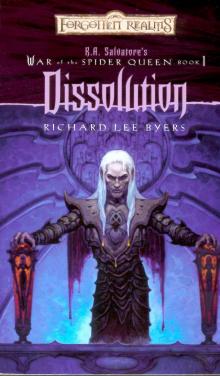 Dissolution
Dissolution Arkham Horror- Ire of the Void
Arkham Horror- Ire of the Void The Haunted Lands: Book II - Undead
The Haunted Lands: Book II - Undead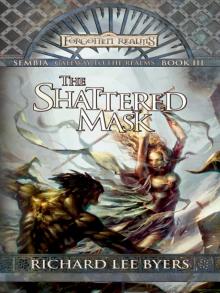 The Shattered Mask
The Shattered Mask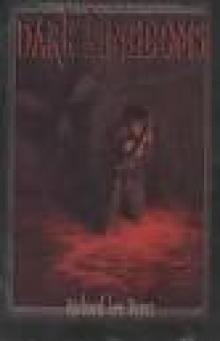 Dark Kingdoms
Dark Kingdoms The Masked Witches: Brotherhood of the Griffon, Book IV
The Masked Witches: Brotherhood of the Griffon, Book IV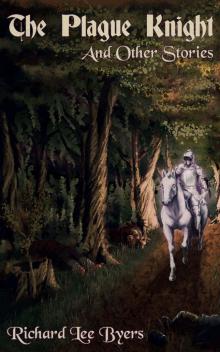 The Plague Knight and Other Stories
The Plague Knight and Other Stories Unclean: The Haunted Lands
Unclean: The Haunted Lands The Captive Flame: Brotherhood of the Griffon • Book 1
The Captive Flame: Brotherhood of the Griffon • Book 1 The Taste of Waterfruit and Other Stories (Story Portals)
The Taste of Waterfruit and Other Stories (Story Portals)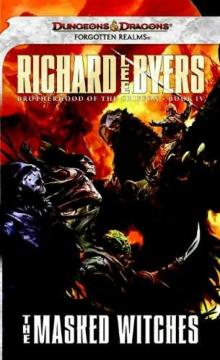 The masked witches botg-4
The masked witches botg-4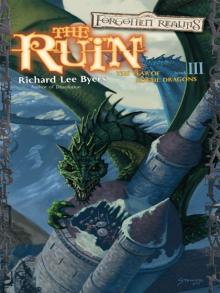 The Ruin
The Ruin The Spectral Blaze botg-3
The Spectral Blaze botg-3 The Masked Witches
The Masked Witches Blind God's bluff bf-1
Blind God's bluff bf-1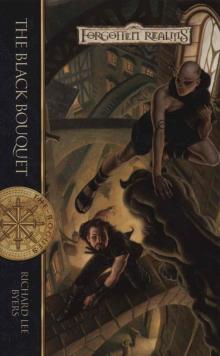 The Black Bouquet r-2
The Black Bouquet r-2 The Rite
The Rite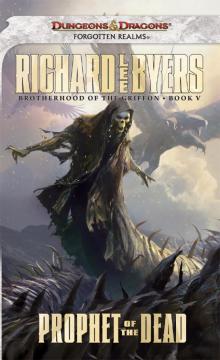 Prophet of the Dead: Forgotten Realms
Prophet of the Dead: Forgotten Realms The Shattered Mask s-3
The Shattered Mask s-3 Called to Darkness
Called to Darkness Undead hl-2
Undead hl-2 Blind God's Bluff: A Billy Fox Novel
Blind God's Bluff: A Billy Fox Novel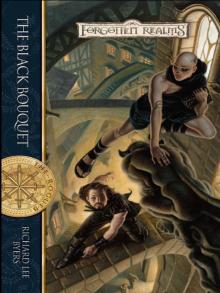 The Black Bouquet
The Black Bouquet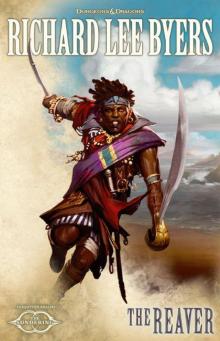 The Reaver
The Reaver The Spectral Blaze: A Forgotten Realms Novel
The Spectral Blaze: A Forgotten Realms Novel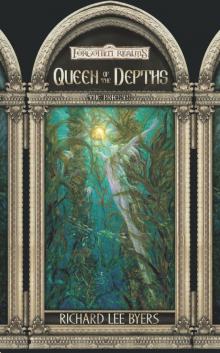 Queen of the Depths
Queen of the Depths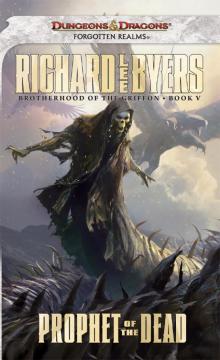 Prophet of the Dead botg-5
Prophet of the Dead botg-5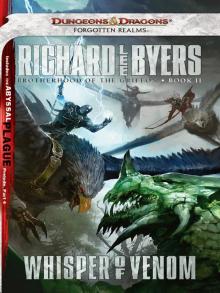 Whisper of Venom: Brotherhood of the Griffon, Book II
Whisper of Venom: Brotherhood of the Griffon, Book II The Captive Flame botg-1
The Captive Flame botg-1 The Haunted Lands: Book III - Unholy
The Haunted Lands: Book III - Unholy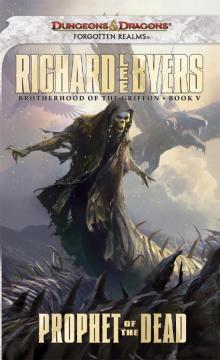 Prophet of the Dead
Prophet of the Dead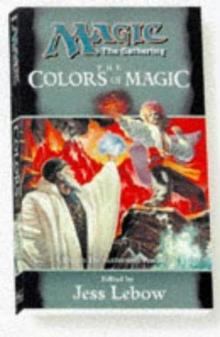 The Colors of Magic Anthology (magic: the gathering)
The Colors of Magic Anthology (magic: the gathering) Unholy hl-3
Unholy hl-3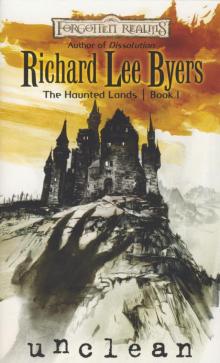 Unclean hl-1
Unclean hl-1 Blind God's Bluff
Blind God's Bluff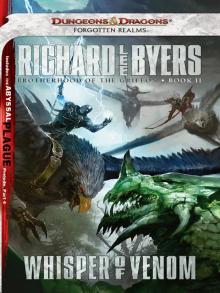 Whisper of Venom botg-2
Whisper of Venom botg-2 The Spectral Blaze
The Spectral Blaze